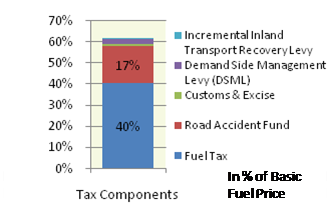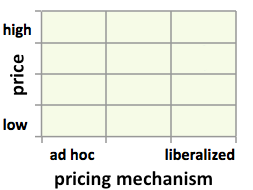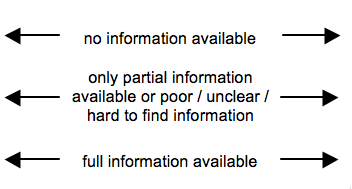Knowledge fuels change - Support energypedia!
For over 10 years, energypedia has been connecting energy experts around the world — helping them share knowledge, learn from each other, and accelerate the global energy transition.
Today, we ask for your support to keep this platform free and accessible to all.
Even a small contribution makes a big difference! If just 10–20% of our 60,000+ monthly visitors donated the equivalent of a cup of coffee — €5 — Energypedia would be fully funded for a whole year.
Is the knowledge you’ve gained through Energypedia this year worth €5 or more?
Your donation keeps the platform running, helps us create new knowledge products, and contributes directly to achieving SDG 7.
Thank you for your support, your donation, big or small, truly matters!
Difference between revisions of "Fuel Prices South Africa"
***** (***** | *****) m |
***** (***** | *****) |
||
| Line 1: | Line 1: | ||
{{Fuel Price Factsheet | {{Fuel Price Factsheet | ||
|Fuel Price Country=South Africa | |Fuel Price Country=South Africa | ||
| + | |Fuel Pricing Policies="Pricing policy: Government regulates gasoline, kerosene, and diesel prices, and in addition LPG prices have been regulated since Jul 2010. Once a month, government announces basic fuel prices for gasoline, diesel, and kerosene; maximum LPG retail prices by location; maximum national retail price of illuminating kerosene; and maximum ex-refinery price of LPG. Basic fuel prices sum CIF, 0.3% ocean losses, cargo dues, coastal storage, and stock financing (currently for 25 days). To the basic fuel price are added customs and excise, specific fuel tax, road accident fund levy (gasoline and diesel), slate levy (gasoline, diesel, and kerosene), petroleum pipeline levy (gasoline and diesel), illuminating kerosene dye levy (diesel; the price difference between kerosene and diesel is about US$0.30/liter), demand-side management levy (gasoline), inland transport recovery levy (gasoline and diesel), wholesale and retail margins, and transport costs. The slate levy settles under- or over-recoveries by oil companies arising from differences between the basic fuel prices, which remain the same for one month at a time, and daily fluctuations in world oil prices. The pricing formula allows for a total of 3 days of demurrage. Monthly retail prices for diesel in the inland area and monthly average FOB benchmark prices relevant to South Africa since 2007 are shown below. The retail price tracks the world price movement closely, and is also markedly higher than the FOB price." | ||
| + | |||
| + | (Source: Kojima, Masami. (2013, forthcoming). “Petroleum product pricing and complementary policies:Experience of 65 developing countries since 2009.” Washington DC: World Bank.) | ||
|Fuel Currency=ZAR | |Fuel Currency=ZAR | ||
|Fuel Price Exchange Rate=7.00221 | |Fuel Price Exchange Rate=7.00221 | ||
| Line 16: | Line 19: | ||
*A constant “Demand Side Management Levy” of 0.1 Rand/litre only for 95 octane petrol is used to artificially promote the consumption of the 93 octane petrol, which is slightly cheaper to produce while exact production costs are not calculated separately. | *A constant “Demand Side Management Levy” of 0.1 Rand/litre only for 95 octane petrol is used to artificially promote the consumption of the 93 octane petrol, which is slightly cheaper to produce while exact production costs are not calculated separately. | ||
|Fuel Price Composition 2=GIZ_IFP2012_South Africa2.png | |Fuel Price Composition 2=GIZ_IFP2012_South Africa2.png | ||
| − | |||
| − | |||
| − | |||
| − | |||
| − | |||
| − | |||
| − | |||
| − | |||
| − | |||
| − | |||
| − | |||
|Fuel Matrix Pricing Mechanism=2 | |Fuel Matrix Pricing Mechanism=2 | ||
|Fuel Matrix Price Level=3 | |Fuel Matrix Price Level=3 | ||
Revision as of 12:50, 26 March 2013
Part of: GIZ International Fuel Price database
Also see: South Africa Energy Situation
Fuel Pricing Policies
| Local Currency: | ZAR |
| Exchange Rate: | 7.00221
|
| Last Update: |
"Pricing policy: Government regulates gasoline, kerosene, and diesel prices, and in addition LPG prices have been regulated since Jul 2010. Once a month, government announces basic fuel prices for gasoline, diesel, and kerosene; maximum LPG retail prices by location; maximum national retail price of illuminating kerosene; and maximum ex-refinery price of LPG. Basic fuel prices sum CIF, 0.3% ocean losses, cargo dues, coastal storage, and stock financing (currently for 25 days). To the basic fuel price are added customs and excise, specific fuel tax, road accident fund levy (gasoline and diesel), slate levy (gasoline, diesel, and kerosene), petroleum pipeline levy (gasoline and diesel), illuminating kerosene dye levy (diesel; the price difference between kerosene and diesel is about US$0.30/liter), demand-side management levy (gasoline), inland transport recovery levy (gasoline and diesel), wholesale and retail margins, and transport costs. The slate levy settles under- or over-recoveries by oil companies arising from differences between the basic fuel prices, which remain the same for one month at a time, and daily fluctuations in world oil prices. The pricing formula allows for a total of 3 days of demurrage. Monthly retail prices for diesel in the inland area and monthly average FOB benchmark prices relevant to South Africa since 2007 are shown below. The retail price tracks the world price movement closely, and is also markedly higher than the FOB price."
(Source: Kojima, Masami. (2013, forthcoming). “Petroleum product pricing and complementary policies:Experience of 65 developing countries since 2009.” Washington DC: World Bank.)
Fuel Prices and Trends
| Gasoline 95 Octane | Diesel | |
|---|---|---|
| in USD* |
|
|
| in Local Currency |
|
|
* benchmark lines: green=US price; grey=price in Spain; red=price of Crude Oil
Fuel Price Composition
Price composition for one litre of Gasoline 95 Octane as of 2010/11/03 in Gauteng ("inland").


Source: http://www.energy.gov.za/files/esources/petroleum/petroleum_breakdown.html (inland, 95 octance petrol, unleaded)
- Retailers set their margins for diesel freely; in Nov. 2011 it was observed ~0.50 rand (~7 US-Cents) and thus being lower than the regulated retail margin for petrol (0.81 Rand or 12 US-Cents); all other values are very similar for Diesel, see source above.
- A “Slate Levy” exists, but was zero in November 2010 (see description under 3.)
- An “Equalization Fund Levy” for equalising fuel prices exists, but is usually set to zero.
- All documents from the web distinguish between coastal prices (cheapest) and inland prices, varying through transportation costs from the coast (harbors/refineries) to regional depots. The price in the province of Guateng is used representatively for the “inland”-prices, being close to the average and also being the most populated and economically most important province of South Africa.
- A constant “Demand Side Management Levy” of 0.1 Rand/litre only for 95 octane petrol is used to artificially promote the consumption of the 93 octane petrol, which is slightly cheaper to produce while exact production costs are not calculated separately.
At a Glance
| Regulation-Price-Matrix |
| ||||
 |

|

|

| ||
All information, including mechanisms, policies and actual prices, is presented very clearly, comprehensively, up-to-date and well-structured. Statistics of (observed) Diesel pump prices might be added.
Sources to the Public
| Type of Information | Web-Link / Source |
|---|---|
| Other Information | http://www.energy.gov.za/files/petroleum_frame.html (Price history, institutions, ...) |
| Price Composition | http://www.energy.gov.za/files/esources/petroleum/petroleum_breakdown.html |
| Pricing Mechanism | http://www.energy.gov.za/files/esources/petroleum/petroleum_docs1.html |
| Pump prices and margins | http://www.energy.gov.za/files/petroleum_frame.html (Under „Petrol Price Archive“ and „Latest Fuel Prices”. Pump prices for Diesel are not monitored.) |
| Wholesale Prices | http://www.energy.gov.za/files/petroleum_frame.html (Under „Petrol Price Archive“ and „Latest Fuel Prices”. Pump prices for Diesel are not monitored.) |
Contact
Please find more information on GIZ International Fuel Price Database and http://www.giz.de/fuelprices



















